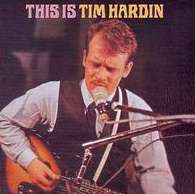This Is Tim Hardin
This Is Tim Hardin is an album by folk artist Tim Hardin, released in 1967.
| This Is Tim Hardin | ||||
|---|---|---|---|---|
 | ||||
| Studio album by | ||||
| Released | September 1967 | |||
| Recorded | circa 1964 | |||
| Genre | Folk | |||
| Label | Atco | |||
| Producer | Daniel N. Flickinger | |||
| Tim Hardin chronology | ||||
| ||||
These early recordings from approximately 1964 were not issued until 1967 when Hardin had achieved success with his albums for Verve. The songs are in a more straight blues style than his later folk, rock and pop stylings.
Reception
| Review scores | |
|---|---|
| Source | Rating |
| Allmusic | |
In his review for Allmusic, music critic Richie Unterberger wrote "The material isn't nearly as distinctive as the best of Hardin's work, but the performances rank with Dave Van Ronk and Fred Neil as the best white blues/acoustic folk to emerge from the early-'60s Greenwich scene... it's still well worth tracking down."[1]
Track listing
Side one
- "I Can't Slow Down" (Tim Hardin) – 3:28
- "Blues on the Ceilin'" (Fred Neil) – 3:56
- "Stagger Lee" (Traditional) – 3:11
- "(I'm Your) Hoochie Coochie Man" (Willie Dixon) – 4:20
- "I've Been Working on the Railroad" (Traditional) – 1:51
Side two
- "House of the Rising Sun" (Traditional) – 4:09
- "Fast Freight" (Terry Gilkyson, Hardin) – 4:05
- "Cocaine Bill" (Traditional) – 2:55
- "You Got to Have More Than One Woman" (Tim Hardin) – 2:01
- "Danville Dame" (Hardin, Steve Weber) – 2:05
Personnel
- Tim Hardin – vocals, guitar
gollark: Well, if you look at java projects then... yes?
gollark: I've seen a bunch of non-object-oriented projects.
gollark: You can do procedural code in most higher-ish-level languages if you want to.
gollark: I mean, some people like using them, I personally don't, either way is easier to work on than assembly, mostly.
gollark: C# actually allows you to do neat functional programming things now, to some extent.
References
- Unterberger, Richie. "This is Tim Hardin > Review". Allmusic. Retrieved June 22, 2011.
This article is issued from Wikipedia. The text is licensed under Creative Commons - Attribution - Sharealike. Additional terms may apply for the media files.